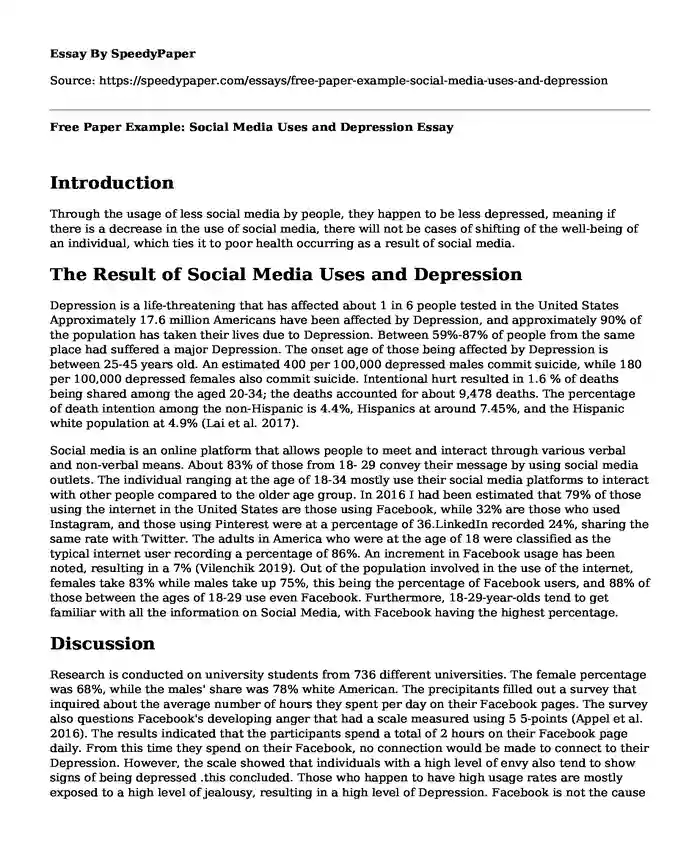
| Type of paper: | Essay |
| Categories: | Social media Depression |
| Pages: | 3 |
| Wordcount: | 618 words |
Introduction
Through the usage of less social media by people, they happen to be less depressed, meaning if there is a decrease in the use of social media, there will not be cases of shifting of the well-being of an individual, which ties it to poor health occurring as a result of social media.
The Result of Social Media Uses and Depression
Depression is a life-threatening that has affected about 1 in 6 people tested in the United States Approximately 17.6 million Americans have been affected by Depression, and approximately 90% of the population has taken their lives due to Depression. Between 59%-87% of people from the same place had suffered a major Depression. The onset age of those being affected by Depression is between 25-45 years old. An estimated 400 per 100,000 depressed males commit suicide, while 180 per 100,000 depressed females also commit suicide. Intentional hurt resulted in 1.6 % of deaths being shared among the aged 20-34; the deaths accounted for about 9,478 deaths. The percentage of death intention among the non-Hispanic is 4.4%, Hispanics at around 7.45%, and the Hispanic white population at 4.9% (Lai et al. 2017).
Social media is an online platform that allows people to meet and interact through various verbal and non-verbal means. About 83% of those from 18- 29 convey their message by using social media outlets. The individual ranging at the age of 18-34 mostly use their social media platforms to interact with other people compared to the older age group. In 2016 I had been estimated that 79% of those using the internet in the United States are those using Facebook, while 32% are those who used Instagram, and those using Pinterest were at a percentage of 36.LinkedIn recorded 24%, sharing the same rate with Twitter. The adults in America who were at the age of 18 were classified as the typical internet user recording a percentage of 86%. An increment in Facebook usage has been noted, resulting in a 7% (Vilenchik 2019). Out of the population involved in the use of the internet, females take 83% while males take up 75%, this being the percentage of Facebook users, and 88% of those between the ages of 18-29 use even Facebook. Furthermore, 18-29-year-olds tend to get familiar with all the information on Social Media, with Facebook having the highest percentage.
Discussion
Research is conducted on university students from 736 different universities. The female percentage was 68%, while the males' share was 78% white American. The precipitants filled out a survey that inquired about the average number of hours they spent per day on their Facebook pages. The survey also questions Facebook's developing anger that had a scale measured using 5 5-points (Appel et al. 2016). The results indicated that the participants spend a total of 2 hours on their Facebook page daily. From this time they spend on their Facebook, no connection would be made to connect to their Depression. However, the scale showed that individuals with a high level of envy also tend to show signs of being depressed .this concluded. Those who happen to have high usage rates are mostly exposed to a high level of jealousy, resulting in a high level of Depression. Facebook is not the cause of Depression; instead, it is the envious nature of the users. So if the user of Facebook happens not to have any envy, there will be no cases of Depression being reported.
References
Appel, H., Gerlach, A. L., & Crusius, J. (2016). The interplay between Facebook uses social comparison, envy, and Depression. Current Opinion in Psychology, 9, 44-49.
Lai, C. H., Wu, Y., T., & Hou, Y. M. (2017). Available network-based statistics in Depression: Theory of mind subnetwork and importance of the parietal region. Journal of affective disorders, 217, 132-137.
Vilenchik, D. (2019). Simple statistics are sometimes too simple: A case study in social media data. IEEE Transactions on Knowledge and Data Engineering, 32(2), 402-408.
Cite this page
Free Paper Example: Social Media Uses and Depression. (2024, Jan 19). Retrieved from https://speedypaper.net/essays/free-paper-example-social-media-uses-and-depression
Request Removal
If you are the original author of this essay and no longer wish to have it published on the SpeedyPaper website, please click below to request its removal:
- Free Essay Sample: Organizational Communication and Social Media
- Free Essay in Medicine: Assessment of the Musculoskeletal System and Pain
- Essay Example with Diagnoses
- Free Essay Example on South Beach Diet for Losing Weight
- Free Essay. Fast Food Advertising
- Essay Sample on Health Promotion in African American Population
- Essay Example on Physician Assisted Suicide
Popular categories




